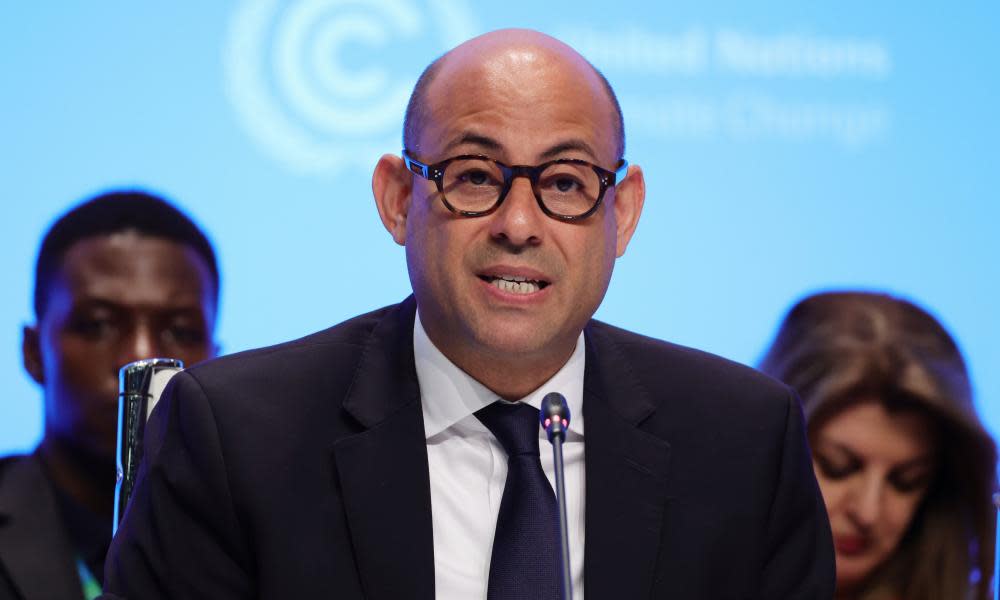Countries must put aside national interests for climate crisis, UN says

The world is at a “tipping point” in the climate crisis that requires all countries to put aside their national interests to fight for the common good, the UN’s top climate official has warned.
Simon Stiell, the executive secretary of the UN Framework Convention on Climate Change, pointed to recent findings from scientists that temperatures were likely to exceed the threshold of 1.5C above pre-industrial levels within the next five years.
“Climate change is accelerating, and we are lagging behind in our actions to stem it,” he warned. “Remember the best available science, which doesn’t arbitrate on who needs to do what or who is responsible for what. The science tells us where we are and highlights the scale of response which is required.”
Stiell was addressing representatives from nearly 200 countries gathered in Bonn, the UN’s climate headquarters, to discuss how to forge a “course correction” that would put the world on track to meet the aspirations of the 2015 Paris climate agreement, and limit global heating to 1.5C.
He urged countries to put aside their differences, after more than 30 years of negotiations since the United Nations framework convention on climate change (UNFCCC) was signed in 1992.
“I believe we are at a tipping point,” he said. “We know that rapid change often follows a long gestation period. Goodness knows that the gestation period for climate action has been long enough. We need to bring that tipping point forward.”
The Bonn conference, a preparatory meeting intended to lay the technical groundwork for the much bigger Cop28 summit that starts in November, opened amid long-simmering contentions. The start of the conference was delayed by two hours as delegates wrangled over the agenda for the next nine days of talks, and the talks have had to start work with a draft agenda while arguments rumbled on.
The Guardian understands that the EU and many developing countries wanted an agenda item to discuss the “mitigation work programme”, which deals with countries’ commitments to cut greenhouse gas emissions, while China fought for a mandate to discuss countries’ plans for adapting to the impacts of the climate crisis.
Other key sources of contention included a resolution to phase out fossil fuels, the role of renewable energy, the issue of loss and damage, which refers to funds to help rescue and rehabilitate poor countries struck by climate disaster, and the global stocktake, which is an assessment of how far off track governments are in meeting their Paris pledges.
Stiell did not name these issues directly, but urged governments to find common ground. “There is at times tension between national interest and the global common good. I urge delegates to be brave, to see that by prioritising the common good, you also serve your national interests – and act accordingly,” he said.
Madeleine Diouf Sarr, the chair of the least developed countries grouping at the UN negotiations, urged all nations to act in the interests of the most vulnerable.
“The success of Cop28 hinges on progress achieved at this Bonn conference. We have to lay the foundations for a Cop28 decision that leads to the curbing of global emissions in line with the 1.5C target and increased funds provided to our countries so we can address the impacts of climate change,” she said.
Alden Meyer, the senior associate at the thinktank E3G, told the Guardian that avoiding a permanent rise in temperatures to more than 1.5C above pre-industrial levels was still possible. “New agreements and commitments by governments and businesses can bring about a transformational roadmap to modernise economies and put global climate action back on track this decade,” he said.
“With six months to go [before Cop28], this meeting in Bonn is a pivotal point on the road. Governments must collaborate to set high expectations for Cop28 outcomes on the new policies and agreements Cop28 must deliver to put global action back on track, and they must build bridges with each other to get there.”
Related: Climate crisis: rich nations undermining work to help poor countries, research suggests
The host country of Cop28, the United Arab Emirates, would be under particular scrutiny, he added. UAE is a producer of oil and gas, which confirmed plans with Opec last week to expand its fossil fuel production next year. Sultan Al Jaber, who will act as president of Cop28, is the head of UAE’s national oil company, Adnoc, a dual role that has enraged climate campaigners.
Meyer said: “The UAE must use the moment as a chance to build trust, credibility, and confidence in its leadership of Cop28. What the UAE says and does, including any new initiatives they launch, will be a test of their credibility.”
Another pressing concern for Stiell, who took the reins at the UNFCCC last year, is the budget for the UNFCCC secretariat. It is already regarded as inadequate for the expanded work that is required in running the annual Cop summits and administering the 2015 Paris climate agreement, but many countries want the UN to do more to provide practical help. Stiell warned of a “massive funding gap”, and urged delegates to agree a budget increase, and for governments to pay what they already owed.

 Yahoo News
Yahoo News 
